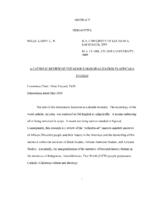- Collection:
- Atlanta University and Clark Atlanta University Theses and Dissertations
- Title:
- A Catholic review of the Moor’s marginalization in Africana studies, 2020
- Creator:
- Miles, Larry L. W.
- Date of Original:
- 2020-05
- Subject:
- Degrees, Academic
Dissertations, Academic - Location:
- United States, Georgia, Fulton County, Atlanta, 33.749, -84.38798
- Medium:
- theses
- Type:
- Text
- Format:
- application/pdf
- Description:
- The title of this dissertation functions as a double entendre. The etymology of the word catholic, in Latin, was rendered in Old English as eallgeleaflic. It means embracing all or being universal in scope. It meant not being narrow-minded or bigoted. Consequently, this research is a review of the “orthodox-ed” (narrow-minded) narrative of African (Moorish) people and their history in the Americas and the domiciling of this narrative within the curricula of Black Studies, African American Studies, and Africana Studies. Essentially, the marginalization of the narrative of Moorish history (Islam) in the narratives of Indigenous, Autochthonous, First World (IAFW) people perpetuates Catholic (Christian) culture and ideology. During my initial dissertation research in Africana studies starting in 2015, I was studying the pre-Columbian African presence in early America with a focus on “Peewee River Indians” in South Carolina. It turned out that there was a strong West African (Malian) influence on the culture and people. This also led me to investigate claims made by the Moorish Science Temple of America (MSTA) and its founder, the Honorable Noble Drew Ali. Ali claimed that the “Indian” people who were here in North America proper (the USA) were, indeed, part of the larger Moorish Empire which encompassed North and West Africa, the Mediterranean, Al Andalusia (Spain and Portugal), the Caribbean and many other locations in the Americas. After comparing the canonized narratives of African people in America to that of the MSTA, this research subsequently demonstrates that the MSTA’s narrative is purposefully marginalized in the larger American society and subsequently Africana Studies. The conclusions drawn from this research suggest that the simplistic or negated narrative of the Moors in American history maintains Western hegemony. Given the religious (Christian) character of Western society and academia, the Moor’s marginalization is indispensable to the Christian narrative and its predominance. Consequently, revision would reshape national, cultural, and religious identities, especially for those who have traversed name changes from Moor (as claimed by the MSTA), to Indigo, Indian, Negro, Black, Colored, Afro, and African American.
- External Identifiers:
- Metadata URL:
- http://hdl.handle.net/20.500.12322/cau.td:2020_miles_larry_l_w
- Rights Holder:
- Clark Atlanta University
- Holding Institution:
- Atlanta University Center Robert W. Woodruff Library
- Rights:
-
